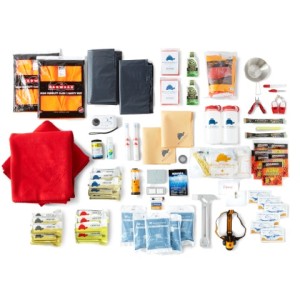It’s no secret that babies come with a lot of baggage. To prepare for a crisis situation, the emergency preparedness experts at Boltwell Survival Kits recommend paring it all down and making these essentials part of your prepping plan:
Diaper changing gear
Baby is going to go no matter what’s going on. And though disposable diapers are convenient, reusable last longer. Also, soft cloths you can wet and to use as wipes are great since they can also be repurposed for first aid. This means some extra thought and preparation if you’re not currently using reusables. Current preparedness warnings suggest that you should prepare for at least three days before help arrives. In that case, putting away approximately 25 extra diapers, while they take a bit of room, won’t add a lot of weight.
Teething essentials
A favorite chewable teething toy or rings and go-to pain reliever should do the trick. If baby’s favorite teether happens to be your fingers, you’ve got one less thing to pack.
Sustenance
Even if baby is breastfed, include a sippy cup or bottle that can be filled with water, juice, or formula (dehydrated or concentrated) in the event of separation. Also, pouches of baby food are better than jars as they don’t necessarily require a spoon. And don’t forget to pack extra water for baby, since you’ll use more than his or her fair share for cleaning up.
Identification
Disasters bring about confusion and accidental separations. An ID tag or card can be vital in helping the lost become found – especially those who can’t speak for themselves. They also help emergency workers to track identities in aid stations and shelters. What we recommend on baby’s ID: name, birth date, the last 4 digits of a SS# and (on a card) a recent picture and/or distinguishing features and birthmarks noted. And don’t forget to add any medications, allergies and medical conditions!
Portable playpen
Not only is it great for napping, but also for creating a safe play area in a small amount of space.
Soft blankie or lovey
A little comfort item goes a long way during an emergency situation.
Pictures of familiar faces
Smiling family and friends help bring a smile to baby’s face, especially when surrounded by strangers.
Favorite toy
Don’t pack your entire playroom or anything that requires batteries. One or two high-stimulation yet low-noise toys, such as wooden blocks or stacking rings, are a good idea.
Nightlight
You may or may not have access to an outlet so think about using a hand-crank flashlight or glow light sticks to keep nightmares at bay.
A sense of calm
No matter how much you’re panicking, it’s important to remain calm as baby will feed off your anxiety. So take deep breaths and hold your little one close. You can do it!
— Trae Nunnink, founder of Boltwell, a provider of high-end emergency preparedness kits and a hater of all things doom and gloom.
